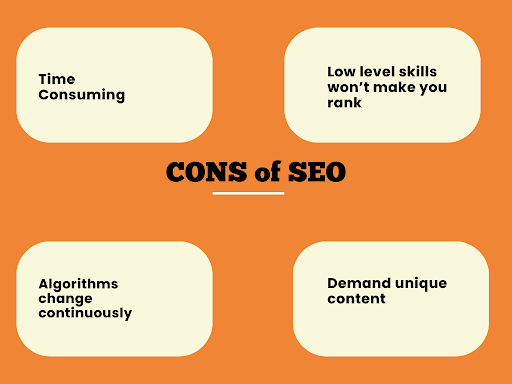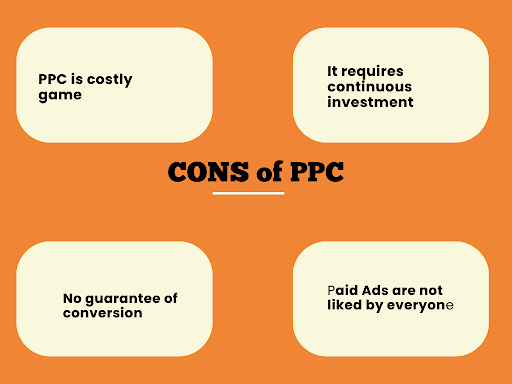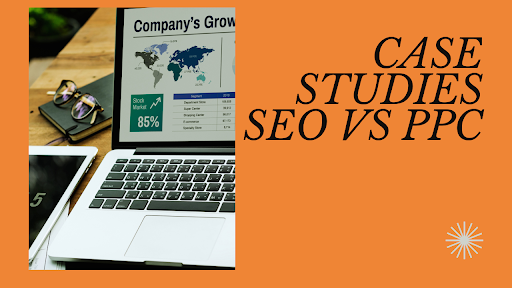Table of Contents
Share This Article :-
1. What's the main difference between SEO vs PPC through a Small Business Perspective?
1. SEO
SEO is basically search engine optimization and people use it to drive organic traffic to their websites, blogs, youtube channels, social media platforms, and email marketing.
Achieving organic reach takes time and effort. You begin by posting content, and the next day, you may find yourself ranking on the (SERP)Search Engine Results Page. That’s not going to happen overnight. Your content will rank but it will take. You have to be patient with search engines and Google algorithms.

Seo Realities:
SEO is:
Pay to Stay.
Achieves long-term results.
SEO suffers from spammy backlinks and adding duplicate content.
2. PPC
PPC is paid-per-click. Utilizing PPC (Pay-Per-Click) marketing can be instrumental in drawing in new customers and fostering the growth of your business.PPC is used for all types of campaigns.PPC (pay-per-click) is used to gain instant results. Your business starts getting attraction from the same day.

PPC Realities:
PPC is:
- Pay to play.
- PPC brings fast results.
- PPC suffers from Click Bots which reduce the accuracy and reliability of click data, potentially affecting the overall performance of PPC advertising.
2. Why do small businesses need SEO and PPC services?
In this section, we will look into the importance of SEO and PPC services for your growing businesses.

1. Importance of SEO
SEO can potentially drive 1,000 % more traffic than any other social media platform. You should set SEO as your main marketing channel when you are starting a small business or startup.
It enhances online visibility, attracts organic traffic, and enables startups or small businesses to compete effectively with larger competitors.
Additionally, SEO provides a cost-effective means to reach a broader audience.
2. SEO Plugins:
You can use different SEO Plugins to manage your optimization process. There are different plugins such as RankMath, Premium SEO Pack, Rankie,Ahrefs, and Hubspot. Automating SEO tasks through plugins becomes a time and effort-saver for small businesses.
The real value of SEO plugins shines through as they play a pivotal role in boosting organic traffic and enhancing search engine rankings. In the fiercely competitive online arena, these improvements become essential for the success of small businesses.
3. Importance of PPC
In today’s competitive market, a small business needs to find new customers and turn existing ones into loyal or repeat customers. Given the constraints of limited marketing budgets, small business owners frequently approach new marketing initiatives.
PPC generates higher ROI through brand awareness. It allows you to measure results and track conversion metrics. You can easily test your campaign and run ads according to your budget. PPC will benefit your startup as it helps you to reach the targeted audience in less time.
3. Search Engine Optimization - Source to reach your prospects through Organic Reach
SEO is like giving your website a facelift to grab the attention on search engines like Google and Microsoft Bing. The aim? When people are hunting for your product offerings, services you excel at, and insights on topics you’re deeply knowledgeable about. Your website doesn’t just show up – it takes the spotlight in search results, ensuring it’s effortlessly found and seen by the audience you’re aiming for.
1. Key features of SEO
How does SEO work? Which factors are involved in optimizing your website? The below paragraphs will be the answers to all these questions. SEO includes:
- On-page SEO
- Off-Page SEO
- Technical SEO
1. On-page SEO
On-page SEO is an ongoing process that extends beyond creating an impeccable page. It requires regular reviews and audits of your content to ensure it remains high-quality, pertinent, and current. Regular checks and updates are essential to ensure your material meets and surpass expectations in the dynamic landscape of online search.

Elements to be optimized in on-page SEO:
- Meta Titles
- Meta Description
- Headings (H1, H2, H3, etc.)
- URL Optimization
- Image Optimization
- Content Optimization.
To learn more about on-page SEO, go through the article titled “SEO for Small Businesses”.
2. Off-Page SEO
When it comes to Off-page SEO, we’re talking about actions taken outside of your website to boost its standing on search engines. These engines tend to favor sites with solid reputations, attributing value to their perceived level of Experience, Expertise, Authoritativeness, and Trustworthiness ( E-E-A-T). It involves building quality backlinks from best performing websites.
1. Backlinks:
It is a process of linking one website to another and this action is performed with anchor text.
2. Types of Backlinks
There are different types of backlinks:
- Do follow links (pass links juice to drive traffic)
- No follow links ( don’t pass link juice, but still plays its part in driving traffic)
- Ugc link: Ugc stands for (User Generated Content ).Links that are created by actively participating in online platforms.
Sponsored links: these are usually shown with ‘sponsored’ tags.

3. Technical SEO
In technical SEO, the focus is on optimizing your website to make it more search engine-friendly. This involves fine-tuning on-page elements like site speed, mobile compatibility, and ensuring secure browsing through SSL/HTTPS implementation.

4. PPC ( Pay-Per-Click) - Gaining traffic through Paid Searches
The global digital advertising expenditure is projected to reach a substantial $757 billion by this year.
PPC Marketing, also known as Pay-Per-Click, is a digital marketing strategy that involves utilizing advertising platforms, such as Google Ads. Its objective is to connect with your target audience by displaying your ads prominently at the top of search engine results.

1. Key Features of PPC are:
1. CPC (cost-per-click):
The cost-per-click (CPC) is the amount that an advertiser pays for each click received on their ad. You can set your CPC according to the budget that you will spend on that ad.

2. Landing Page
The Landing page may be either your homepage or the webpage where consumers end up after clicking your PPC ads.
3. Keywords Research
Keyword research is important while launching your ad.
These keywords communicate to search engines the specific terms or search queries you desire for your ad to appear alongside in the Search Engine Results Pages (SERPs). It plays a great role in driving traffic and generating ROI.

Cost per mile (CPM), ad rank, and maximum bid are other important features of PPC.
5. Benefits and Drawbacks of SEO vs PPC( Search Engine Optimization ( SEO) vs Pay-Per-Click (PPC)
1. Benefits of SEO Statistically
1. Improve organic and targeted reach for free
If your website shows up at the top on Google when people search for specific keywords, you’ll attract a steady stream of visitors. By putting a spotlight on content marketing, you have the opportunity to establish your brand as the ultimate source in your industry. This means showing up for all the relevant keywords improves organic traffic and increases visitors. It helps you to set yourself as an authority in your niche.
2. SEO is inexpensive and increases ROI
Because SEO doesn’t incur costs, the return on investment (ROI) tends to be more favorable.SEO stands out as one of the most budget-friendly marketing methods, offering an inexpensive means to enhance your brand. With organic traffic coming in without any payment, you can handle a significant portion of the optimization work on your own.
3. Every part of your sales funnel is under target
Whenever a person considers buying anything, Google research is a must to gather ideas and reviews about the product. Attracting clients in the early stages with SEO helps to cut down the cost of acquisition (AC).

2. Drawbacks Of SEO Statistically
1. Time-Consuming
It’s important to note that SEO efforts don’t yield immediate results. It typically takes between six months and a year to witness substantial progress.
If you aim to drive instant traffic, SEO might not be the most suitable choice. The earlier you initiate your SEO tactics, the sooner you’ll experience the lasting benefits I mentioned.
2. Algorithms change consistently and demand unique content
Producing content with limited resources can be a good use of time and money. Content that meets user experience criteria and incorporates industry insights has a higher chance of ranking easily. Algorithms are not consistent and change rapidly, so to establish yourself as an authority, it’s crucial to stay updated with these changes.

3. Low level of skills won’t let you rank for every keyword
Seo is not a person game. You can’t create content, optimize it, and look into its complexities. Seo is complex and requires great understanding. Few words are so competitive and you can’t rank on it in minimal time. They require great understanding, time, and money to rank for it. If you take my advice use keywords wisely.
3. Benefits of PPC Statically
1. PPC allows you to niche/targeted marketing with full control
You can create PPC campaigns to reach your potential customers by deciding keywords, demographics, and brand values. You have complete control over the selection of keywords selection, landing pages, and call-to-action for your next PPC campaign.
2. PPC provides immense data and the budget is in your hands
When you run a PPC campaign, you can check everything. You can assess which keywords perform well, and identify ads and landing pages that convert consumers into buyers. It provides you with immense data with the privilege to decide budget accordingly.

3. Independent of Algorithms and generates revenue through Clicks
PPC doesn’t depend on Algorithms. Your PPC campaigns won’t be affected by any change in algorithms. The majority of users clicking on your PPC ads are likely in the final stages of making a purchase. This is because PPC ads generally focus on high-intent commercial keywords.
4. Drawbacks of PPC Statistically
1. Everyone does not like paid Ads
Ads are not liked by everyone. So, might be your PPC campaign gets ignored by your potential customer. Cost-per-click is increasing massively. When delving into industry-specific cost-per-click, expenses tend to escalate. However, Seo on the other hand attracts traffic without a penny.
2. PPC is a costly game with continuous investment
Your PPC ads stop the day you stop investing money in your PPC campaigns. Here comes SEO vs PPC confusion. Clear your confusion by investing according to your goals.

3. No Guarantee of Conversion
There is no guarantee that customers visiting your site will convert or make a purchase. To maintain engagement, it’s crucial to regularly update and refresh your ads. Avoid being overly salesy. When your clients sense that you are just selling and not solving, believe me, they ignore it.
6. Strategic Fusion: SEO and PPC for Small Business Success
How do we use strategically fue SEO and PPC to generate mind-blowing output? SEO and PPC when used together increase brand awareness, generate higher ROI, make you less dependent on ads, and enhance user experience.

1. Conversion through Remarketing
Remarketing involves displaying a PPC ad to individuals who have previously visited your website. The greater the number of site visitors, the larger the audience available for targeting through PPC.PPC ads can complement SEO efforts by ensuring visibility for specific keywords while waiting for organic rankings to improve. This dual approach increases the likelihood of attracting a broader audience.
For instance: Consumers leave your website after reading a blog post without performing the task.But if you run add and offer discount. At this moment, our remarketing PPC ad takes the spotlight. It not only promotes our site but also entices the user with a 25% annual discount if they sign up immediately. There are greater chances that consumers who are reading your blog post will sign up.
2. Search Analysis and Clicks
Google Ads provides valuable data, including search terms, CTR (Click-Through Rate), Conversion rate, ROAS (Return on Ad Spend), and revenue figures, offering actionable insights for the SEO team. We emphasize to our clients that every click is meaningful. No click is considered wasted; instead, each click contributes valuable information about our target customers.
3. Use same keywords and tools to boost brand presence
By aligning your SEO and PPC efforts around common keywords, you create a cohesive online presence. You can widely-used tools like Google Analytics, SEMrush, Google Search Console, Google Ads, Ahrefs, and Facebook Ads is beneficial for both SEO and PPC endeavors. These strategies can enhance your brand awareness.
7. When do small businesses need to implement SEO and PPC?
1. Implementation of Search Engine Optimization
1. When you want to enhance the quality and maintain authority of your website
An influential website, once established, can attract significant traffic solely through URL recall. Building an authority site involves consistently driving traffic to your pages, and gradually earning a reputation that leads to dominance in the market. Sustainable traffic generation relies on well-crafted content supported by strategic SEO planning.
2. For consistent results and organic reach
Seo brings consistent long-term results with time through organic reach. Nothing is going to happen overnight.
2. Implementation of Pay-Per-Click
1. Generating immediate traffic through PPC marketing
Promoting time-sensitive products, services, or events can be challenging due to the lengthy time it takes for SEO campaigns to show results. However, with PPC marketing, you can swiftly generate traffic for offers with a short expiration date. Need to advertise something ending in a few days, hours, or a month? No worries – PPC can bring in the desired traffic within minutes. PPC marketing generates traffic by spreading awareness related to your services to your target audience.
2. When Content on your Website isn't designed to be highlighted through SEO
If your website lacks SEO-friendly design – with content-rich and regularly updated pages – it might struggle to signal relevance to search engines. Certain types, like squeeze pages, lack the necessary content for Google’s attention. In such cases, PPC campaigns become a valuable tool for generating traffic and visibility.
3. For Securing a Prominent Presence in Search Results
To secure a prominent presence in search results for your keyword category, consider PPC. Sponsored links appear above organic results, capturing up to 50% of search traffic. By abstaining from PPC, you risk surrendering these clicks to competitors. To maximize your click-share for relevant keywords, engaging in PPC is essential for a competitive edge.
8. On which Small businesses have to Focus(SEO vs PPC)?
Asking a question like where small businesses have to invest either in SEO or PPC. It’s a small war between SEO vs PPC against a space while both are equally important depending on the situation and requirements.
Small businesses focus on SEO when they need:
- They don’t want to spend money for driving traffic
- Need to gain customer loyalty through unique content and products
- They want to generate ROI through long-term investment.
Small businesses focus on PPC when they need:
- Immediate results
- Their product is unique and is only of its type.
- They have to direct customers toward landing or scale pages by offering time-sensitive deals.
9. Case Studies of SEO and PPC for Small Businesses
These case studies will help you understand the importance of SEO vs PPC.

1. Illustration of small businesses reaping success from PPC
VIOS Fertility by Kindbody facing problems regarding traffic and ranking. Hawksem adapted marketing strategies, initially planned for Google Ads, SEO, Bing, and Facebook Ads. The focus shifted as the merger unfolded, demanding adjustments in SEO and ad group setups to support both Kindbody and VIOS during their website migration. They revamped their Google ads, add new content, and designed new paid campaigns for them which helped VIOS Fertility to increase website visitors by 128 % which in turn increased their traffic.

2. Illustration of small businesses reaping success from SEO
Hilary, a small beauty salon situated in a vibrant neighborhood, encountered visibility challenges typical for new businesses entering the competitive beauty industry. They created their website and implemented SEO strategies with the help of Biziq, enabling them to build authority through online presence.
10. Final Thought
On each visit to Google, a user browses an average of 8.79 pages. This shows building a solid online presence is important for every business either small or big. A website’s traffic is generated by organic sources, accounting for 53.3% of the total.
Businesses generate $2 for every $1 spent on PPC advertising. Seo and PPC are equally important for every business. Above mentioned content related to Seo vs PPC clearly shows importance alongside cons of it.
Small businesses have to choose wisely and implement both of it when required.